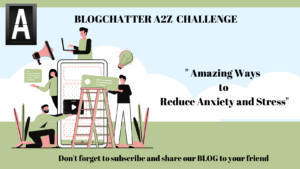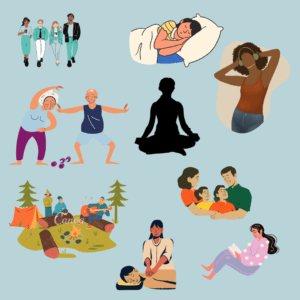
Anxiety and stress are common problems faced by many people in today’s times. The fast-paced lifestyle, technological advancements, work pressure, financial instability, and the ongoing COVID-19 pandemic have contributed to increased levels of anxiety and stress in individuals. In the below paragraphs, find out the amazing ways to reduce stress and anxiety.
Anxiety is a feeling of unease, such as worry or fear, which can be mild or severe. It can cause physical symptoms such as sweating, trembling, and a rapid heartbeat. Stress is the body’s response to a threat or demand, which can be a physical, emotional, or psychological trigger. Chronic stress can lead to physical health problems such as high blood pressure, heart disease, and a weakened immune system.
In today’s times, constant exposure to news and social media can contribute to anxiety and stress. The fear of missing out (FOMO) and the pressure to be constantly connected can also lead to anxiety. Work-related stress has also increased due to job insecurity, long work hours, and increased competition.
To manage anxiety and stress, it is essential to practice self-care. This includes getting enough sleep, eating a healthy diet, exercising regularly, and taking breaks to relax and unwind. Mindfulness and meditation can also be helpful in reducing stress and anxiety. It is also important to seek professional help if the symptoms persist or become unmanageable. Therapies such as Cognitive Behavioral Therapy (CBT) and medication can be effective in treating anxiety and stress.
Here are 10 amazing ways to reduce anxiety and stress:
- Exercise: Physical activity is a great way to reduce stress and anxiety. Exercise helps to release endorphins, which are the body’s natural mood boosters. Exercise is a proven way to reduce anxiety and stress levels. When you exercise, your body releases endorphins, which are the body’s natural mood boosters. These endorphins help to reduce feelings of stress and anxiety and promote a sense of well-being. Additionally, exercise can help to reduce muscle tension and promote relaxation, which can further help to reduce stress levels. Overall, exercise is an effective and natural way to reduce anxiety and stress, and incorporating regular physical activity into your routine can have a significant positive impact on your mental and emotional health
- Mindful Meditation: Practicing mindful meditation involves paying attention to the present moment without judgment. It can help to reduce stress and anxiety by calming the mind and increasing awareness. When we practice mindfulness, we learn to observe our thoughts and feelings without getting caught up in them or reacting to them. This can help to break the cycle of negative thinking and reduce feelings of stress and anxiety. Additionally, research has shown that mindful meditation can help to reduce levels of the stress hormone cortisol, lower blood pressure, and improve overall mood. By incorporating mindful meditation into daily routine, one can learn to manage stress and anxiety more effectively and improve overall well-being.
- Yoga: Yoga is a mind-body practice that incorporates physical postures, breathing techniques, and meditation. It reduces physiological stress. Yoga postures and breathing techniques help reduce the body’s stress response by lowering heart rate, blood pressure, and cortisol levels. Yoga promotes a sense of relaxation and calmness by activating the parasympathetic nervous system, which is responsible for rest and digestion. Practising yoga increases the production of feel-good hormones like serotonin and dopamine, which can help alleviate symptoms of anxiety and depression. Yoga helps in cultivating mindfulness and awareness of the present moment, which can help reduce rumination and worry. Thus yoga can be a helpful tool for managing stress and anxiety.
- Deep Breathing: Taking deep, slow breaths can help to calm the nervous system and reduce anxiety. Deep breathing is an effective technique to relieve stress and anxiety as it helps activate the relaxation response in the body. When you take slow and deep breaths, it sends a signal to your brain to relax and calm down, which in turn reduces the stress response in the body. When you’re stressed or anxious, your body’s “fight or flight” response is triggered, causing your heart rate and blood pressure to increase. Deep breathing activates the parasympathetic nervous system, which slows down your heart rate and helps lower blood pressure. Slow and deep breathing helps relax the muscles in your body, especially in your chest, shoulders, and neck. This can help reduce tension and promote relaxation. It increases the amount of oxygen in your body, which helps to clear and calm your mind and increase alertness and improve your focus and concentration. To practice deep breathing, find a comfortable and quiet place to sit or lie down. Close your eyes and take slow, deep breaths in through your nose and out through your mouth. Count to 4 as you inhale, hold your breath for a count of 8, then exhale slowly for a count of 8. Repeat this cycle for a few minutes, or until you feel relaxed and calm.
- Journaling: Writing down thoughts and feelings can be a helpful way to process emotions and reduce stress. Journaling is a powerful tool that can help reduce stress and anxiety by allowing you to express your thoughts and emotions in a safe and non-judgmental way. Writing down feelings, concerns, and worries can help gain clarity and perspective on the problems, as well as identify patterns and triggers that may be contributing to stress and anxiety. Write freely and without judgment, focusing on your thoughts, feelings, and experiences. You can write for as long or as short a time as you like, and you can choose to write in a physical notebook or on a digital platform. Regular journaling can help you build resilience and cope more effectively with stress and anxiety. It provides an outlet for emotions. Writing down thoughts and feelings can help to healthily process them, rather than bottling them up inside. This can help reduce the intensity of negative emotions and promote a sense of emotional balance. Journaling can help you brainstorm solutions to problems and challenges, and come up with action plans to address them. This can help you feel more empowered and in control of your life, which can reduce feelings of stress and anxiety. This can help you develop a greater sense of inner peace and calm, which can reduce stress and anxiety.

- Spending Time in Nature: Spending time in nature can have a calming effect on the mind and body. It has been shown to be an effective way to reduce stress and anxiety. Being in a natural environment can help calm the mind and promote relaxation, which can in turn reduce the physiological symptoms of stress and anxiety. To benefit from spending time with nature, you can take a walk in a park or natural area, hike in the woods, go for a swim in a lake, or simply sit and enjoy the scenery. Even a few minutes of exposure to nature can help reduce stress and anxiety, so try to incorporate it into your daily routine whenever possible. Nature has a calming effect on the mind and body. It can help reduce stress hormones, lower blood pressure, and slow down the heart rate. These relaxation response helps promote a sense of calm and well-being. Spending time in nature can help improve mood and reduce feelings of anxiety and depression. Exposure to natural light and fresh air can help boost the production of serotonin, a neurotransmitter that regulates mood and helps promote feelings of happiness and well-being. ( Here I would like to question the happiness index of the so-called happiest country in the world – Finland) The sights, sounds, and sensations of the natural world can help you become more aware of your surroundings and your own internal experiences, which can help reduce stress and anxiety. Spending time in nature can help provide a sense of perspective and remind us of the bigger picture. Nature can help us feel more connected to the world around us, and remind us that our problems are just a small part of a larger whole.
- Listening to Music: Listening to calming music can help to reduce stress and anxiety by slowing down the heart rate and lowering blood pressure. Music has been shown to have a direct impact on the brain and the body and can help promote relaxation, improve mood, and reduce the physiological symptoms of stress and anxiety. Music has a calming effect on the mind and body and can help reduce stress hormones, lower blood pressure, and slow down the heart rate. This relaxation response helps promote a sense of calm and well-being. Listening to music can help improve mood and reduce feelings of anxiety and depression. Music can help stimulate the production of dopamine, a neurotransmitter that regulates mood and helps promote feelings of happiness and pleasure. It can help distract the mind from negative thoughts and feelings, and provide a temporary escape from stress and anxiety. This can help reduce rumination and promote a more positive outlook. To benefit from listening to music, choose music that you find soothing and calming. Slow, instrumental music, such as classical or natural sounds, can be particularly effective for promoting relaxation. You can listen to music while doing other activities, such as working, exercising, or meditating, or simply take a few minutes to sit and listen to music without distraction. Regularly incorporating music into your daily routine can help reduce stress and anxiety and promote a greater sense of well-being.
- Social Support: Spending time with friends and family and talking about your feelings helps to reduce stress and anxiety. Spending time with people who matter, can be an effective way to reduce stress and anxiety. Human beings are social creatures, and social support is an important factor in maintaining mental health and well-being. Spending time with loved ones can help provide a sense of connection and belonging, which can help reduce feelings of isolation and loneliness. Having social support can also help you feel more resilient in the face of stress and adversity. Spending time with our own clan can be a source of joy and pleasure, which can help promote relaxation and reduce stress hormones. Laughter, in particular, has been shown to have a direct impact on reducing stress and anxiety. Laughter clubs in nearby gardens were started for senior citizens for this purpose only. Engaging in social activities and supporting others can help you feel like you are making a positive difference in the world, which can in turn reduce stress and anxiety. Make an effort to prioritize social activities and maintain strong relationships with loved ones. This can include regular phone calls, text messages, or video chats, as well as personal visits and social outings. Be open and honest with your loved ones about your feelings and concerns, and don’t be afraid to ask for support when you need it. Regular social interaction can help reduce stress and anxiety and promote a greater sense of well-being.
- Massage Therapy: The physical manipulation of soft tissues and muscles can help promote relaxation, improve circulation, and reduce the physiological symptoms of stress and anxiety. Massage therapy has a direct impact on the nervous system. It reduces muscle tension which may be caused by stress and anxiety. This leads to aches and pains. Massage therapy promotes relaxation, and alleviates physical symptoms of stress and anxiety. Human touch is a powerful form of communication and can help promote feelings of safety, comfort, and connection. Massage therapy can provide a safe, nurturing touch that can help reduce stress and anxiety and promote a greater sense of well-being.To benefit from massage therapy, consider scheduling regular appointments with a licensed massage therapist. Be sure to communicate your specific needs and concerns, as well as any medical conditions or injuries, to ensure that the massage is tailored to your individual needs. Incorporating massage therapy into your self-care routine can be an effective way to reduce stress and anxiety and promote a greater sense of well-being.
- Get Enough Sleep: Getting enough sleep is essential for managing stress and anxiety. Aim for 7-9 hours of sleep per night to help keep stress levels in check. Sleep is a crucial aspect of overall health and well-being, and getting enough sleep is essential for reducing stress and anxiety. Cortisol is a hormone that is released in response to stress. Chronic stress can cause cortisol levels to remain elevated, which can lead to a range of negative health effects, including anxiety. Getting enough sleep can help reduce cortisol levels and promote a greater sense of calm. Sleep deprivation can cause irritability, mood swings, and a range of other negative emotional symptoms. Getting enough sleep can help improve mood and promote a greater sense of well-being. Sleep is essential for cognitive functioning, including attention, concentration, and memory. Chronic sleep deprivation can lead to cognitive impairment, which can exacerbate feelings of stress and anxiety. Getting enough sleep can help enhance cognitive functioning and promote a greater sense of mental clarity. Sleep is essential for immune function, and chronic sleep deprivation can lead to a weakened immune system. This can increase the risk of illness and infection, which can in turn aggravate stress and anxiety. Getting enough sleep can help boost immune function and promote overall health and well-being.To benefit from the stress-reducing effects of sleep, aim to get 7-9 hours of sleep per night. Establish a consistent sleep schedule, avoid caffeine and alcohol before bed, and create a relaxing bedtime routine to help promote better sleep. If you struggle with sleep, consider talking to a healthcare provider or sleep specialist to identify any underlying issues and develop a personalized plan for improving your sleep.
Incorporating one or more of these techniques into your daily routine can help to reduce anxiety and stress and promote overall well-being. It is important to note that these techniques alone may not be enough to address severe or chronic anxiety, and it is important to seek professional help if needed.

This post is part of #BlogchatterA2Z2023.

So happy to know I’m doing most of these 😀
The topic is well-researched and beautifully drafted.
Thanks!
This is a great post.
Very informative post! As someone who deals with on/off anxiety, I try to follow many of these. Especially meditation 😊
Thanks Careena. I am sure, meditation will help. Pls do incorporate it into your schedule and be stress-free.
This post is a gold mine! Such valuable info and pertinent steps can help to reduce stress and anxiety. My fav one is to do EFT as much as I can.
Thanks, Pratibha. I am so happy to know that you find it helpful.
I have recently started journaling and it has been really helpful.
Thanks for sharing your experience.